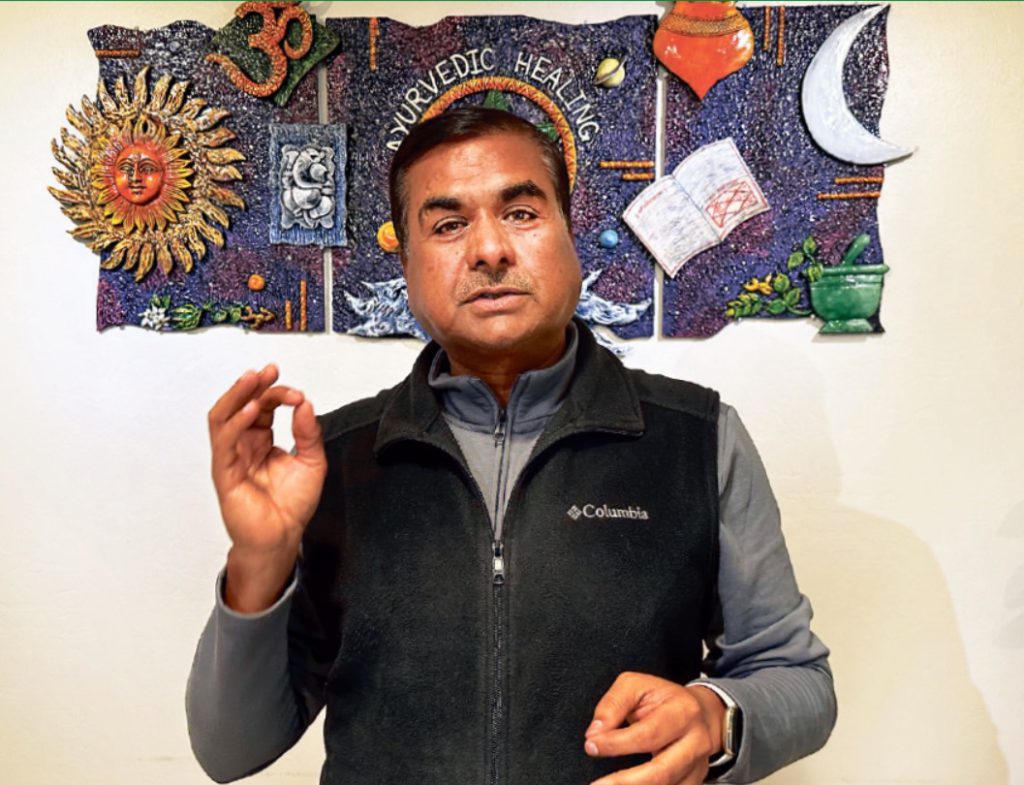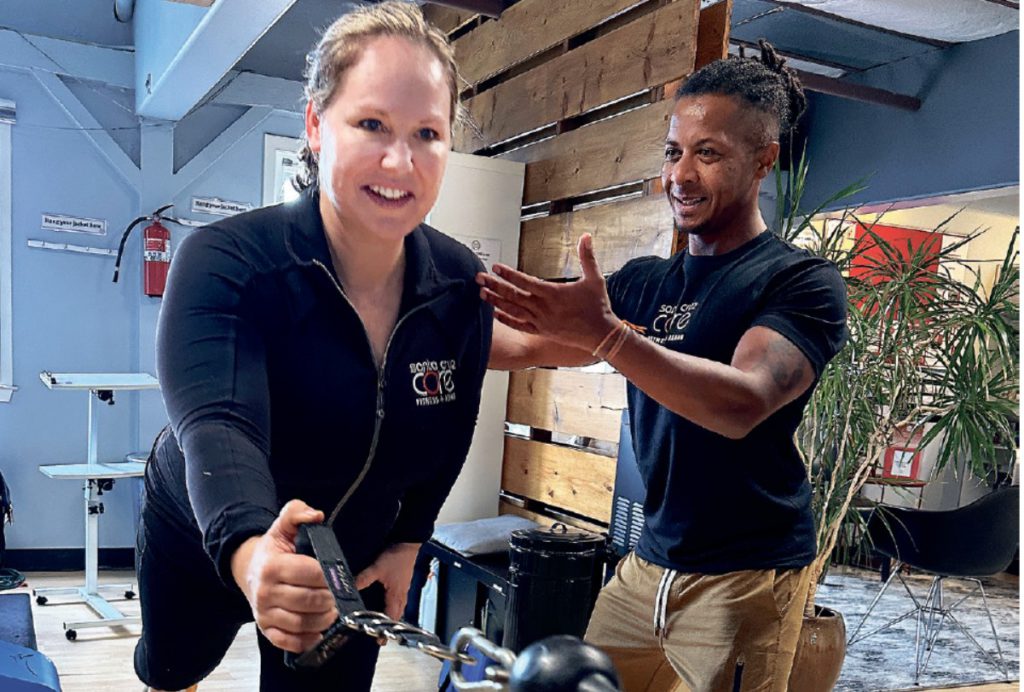As we dive headfirst into 2024 brimming with new resolutions, with all of the breakthroughs in the field of health and wellness, it’s a good time to revisit our options. On a national level, the big headlines latched onto a new class of injectable weight loss drugs with guaranteed results, various side effects and a hefty price tag.
Today this treatment is available to anyone seeking a weight loss hack who can afford it. And the response has been so overwhelming, even the pain of a weekly injection hasn’t curbed growing demand. So, if a resolution to change your eating habits strikes a fear too hard to face, you can pay your way straight to the end zone.
Levity aside, there’s a reason New Year’s resolutions are seldom sustainable; lifestyle habits are notoriously hard to change. Willpower sounds tiring, exercise takes work, and if there’s a solution that’s slightly less painful, sign me up.
The quick-fix solution does beg some questions though. Like how will re classifying obesity as a disease in need of a pharmaceutical cure change our overall view of personal responsibility? Is outsourcing our health to big pharma a smart path to wellness? This commentary does not discount the fact that pharmaceutical interventions save lives for those who need them. The bottom line is, are they helping or hindering those who don’t?
The answers depend on whom you ask. The National Wellness Institute, the research organization credited with applying a cohesive approach to the subject, defines wellness as “a process of becoming aware of and making choices toward a more successful existence”.
Don Ardell, PhD. and author of the groundbreaking book High Level Wellness; an Alternative to Doctors Drugs and Disease contends the single greatest cause of poor health in this nation is “most Americans neglect, and surrender to others, responsibility for their own health”
If you agree with that perspective, then taking responsibility sounds like the better option. And here’s where the news gets good.
Starting with willpower. Turns out the act of forcing yourself to do or not do things you really want to, does not make for lasting habit change. Nor does committing to an exercise you dislike, or anything that ultimately feels like sacrifice. This is one big reason why so many resolutions fail.
Over the decades we’ve seen rates of obesity rise in direct correlation with lack of access to fresh foods and green space. Studies show maintaining a health resolution is less about willpower and more about logistics than we may think.
Stress, good or bad, drives short-term thinking. And when the level climbs too high, you feel a biologically-driven need to stop the pain. Suddenly, no matter how much you love your superfood smoothie, you know that only a bacon double cheeseburger can instantly take the pain away.
Yes, breakthroughs like Wegovy, Ozempic and Mounjaro are big news, but true wellness is ultimately an inside job. As Dr. Ardell reminds us, the charge for your health is all yours, but you don’t have to do it alone. In fact, studies show you’ll be more successful with group or professional support.
The Local Leading Edge
Environment and lifestyle go hand in hand, and here is where you and I get the edge. Nestled along the picturesque coast, Santa Cruz is celebrated as a wellness mecca, offering a sanctuary for those seeking holistic health and balanced living.
With its abundance of fresh, locally sourced foods and ample green spaces, the city provides a nurturing environment conducive to well-being. Santa Cruz stands out as a vibrant community dedicated to fostering a culture of wellness.
An Eastern Approach
Suhas G.Kshirsagar BAMS, MD, is an advisor to the world-renowned Chopra Center and the Director of Ayurvedic Healing at the Soquel-based Integrative Wellness and Pancha Karma center. A recognized leader in the field of Ayurveda & Integrative Medicine, Dr. Suhas has traveled around the globe popularizing Ayurveda, Yoga, Meditation & Natural Medicine.
I learned of Dr. Suhas’ work years ago, while searching for a non-pharmaceutical alternative for my daughter’s asthma.The complaints that Dr. Suhas hears daily, from high body weight, low energy, and poor sleep, to headaches, unexplained congestion, and depression, all have a surprising common denominator: a weak digestive “fire.”
Drawing on traditional Indian practices and principles, his best-selling book The Hot Belly Diet shows you how to optimize your digestive powers to foster rapid weight loss and vibrant health.
At the core of this three-phase diet that makes lunch the most important meal of the day is a dish called khichadi (pronounced kitch-a-de)—a completely nutritious but incredibly easy-to-make meal that helps clear out your “ama,” or the digestive sludge that antagonizes weight loss, provokes hormonal imbalances, and ultimately triggers inflammation—the root cause of virtually all disease. It also explains what foods are incompatible (milk and eggs, for example), why the sensation of hunger is essential, and how to time your meals throughout the day to avoid snacking.

When it comes to those New Year’s resolutions, diet is but one piece to an integrative approach. Dr. Suhas explains. “Weight Loss is much easier and more sustainable when you invoke your inner intelligence. Eating the right foods at the right time, suitable to your body type and using spices that regulate your metabolic pathways. The key is a health-conscious lifestyle, positive attitude and regular detoxification.”
According to Dr. Suhas, most people think of a detox as a superficial process. You change your diet, or take supplements, or abstain from harmful substances and the body does the rest. Suhas is an advocate of all these methods but knows that many of his patients have health concerns that go beyond a poor diet. They need a multi-faceted approach to rid their bodies of excess toxins to function optimally.
“When you carry a burden of toxins from these various sources, you may gain weight, have low energy, achy joints, skin rashes, small things, nagging headaches that don’t seem tied to any particular ailment,” he says.
“People can walk around in this state of lower-level toxicity for years, reaching for cold medicines, headache remedies, allergy medications, antacids. They rely on over-the-counter remedies when what they need is a deep tissue cleanse that will clear the body of all of this debris. We need to use a combination of heat, oils, massage and other treatments to get the body to purge the substances it has been holding on to.”
Eating, exercising, and living in harmony with your body-type, known as a dosha in Ayurvedic terminology, are essential for maintaining good health, yet Ayurveda offers an additional method for flushing ama (endotoxins) out of the body. When the seasons change, or if you need to address a particular health concern, you may need to cleanse and rebalance doshas that are aggravated or deficient.
In Ayurveda, this detoxifying process is called panchakarma—literally “five actions” or “five treatments” in Sanskrit. Done under the care of an Ayurvedic practitioner, panchakarma is tailored to your dosha. It includes oil massages, steam-sweat treatments, herbal enemas, nasal administrations of herbs and oils, and/or gentle laxatives and emetics.
These techniques cleanse the body of toxins that have been absorbed by the tissues and that could contribute to illness.
One of the most effective healing modalities in Ayurvedic medicine, panchakarma detoxifies the body, strengthens the immune system, and restores balance and well-being. By activating the body’s organs of elimination—the sweat glands, lungs, bladder/urinary tract, stomach, intestines, colon—panchakarma rejuvenates body, mind, and spirit.
A Western Approach
For those seeking a more mainstream approach, Cheri Bianchini RN, PHN founder of The Healthy Way, has been offering a safe and supportive haven to those struggling with weight management for more than 38 years. Regarding the new weight loss drugs, Cheri says that she and her team of experts have “seen it all over the years and know if it seems too good to be true, it probably is just that!” She’s learned that without a designated food plan and commitment to exercise, most people will fail at keeping weight off.
Bianchi contends that for most clients she works with, the key to sustained weight loss begins with balancing blood sugar. She says blood sugar concentration can determine how you feel physically and emotionally. Blood sugar stabilization keeps energy up, helps control hunger and prevents mood swings.
A low blood sugar level can cause irritability, fatigue, lethargy, excessive hunger, moodiness, depression and cravings for sweets — factors which can undermine a healthy diet. A stable blood sugar / glucose level is the cornerstone of The Healthy Way Program and is accomplished through individually tailored, low-glycemic meal plans and snack ideas, an exclusive Healthy Way Chewable Supplement for blood sugar stabilization and nutritional/motivational coaching and counseling and regular exercise.
And for those who need a pharmaceutical intervention to manage diabetes, Healthy Way offers a new medication-assisted program for a fraction of the cost of the new weight loss drugs.
When it comes to innovation, Healthy Way has teamed up with local expert Jay Pennock MD to offer the more natural, compounded generic version of Semaglutide, a medication used to help people with type 2 diabetes manage their blood sugar levels. It works by mimicking the action of a natural hormone called GLP-1. Coupled with individualized nutrition counseling, accountability, support and lifestyle education, clients stand a much better chance at maintaining weight loss.
Cheryl and her team encourage their clients to think of the diabetic intended/weight loss med as a “last resort” and to try the standard program first. To be sure, Semaglutide is not without its own set of complications such as nausea and GI tract issues, but for the most part these are short-lived. Yet for those who have exhausted the alternatives, this solution is a game changer. The assist gives them the kick-start they need to make the lifestyle changes they’re seeking.
A Relational Perspective
On a broader scale, one new study offers fresh insights into the age-old question of why some people are able to reach their lifestyle, including weight loss goals more readily than others.
Study author Abdo Elnakouri, a Banting Postdoctoral Fellow at the Kellogg School of Management at Northwestern University, has identified a significant factor in personal goal achievement: the phenomenon of “shared reality” with “instrumental others”.
According toElnakouri, Shared reality refers to the perception of sharing inner states – feelings, beliefs, or concerns – with others regarding the world. This concept goes beyond mere liking or closeness in relationships. It involves creating a common understanding of external events, people, and objects, which is crucial for navigating and succeeding in the world.
Instrumental others refers to individuals in our lives who significantly aid or facilitate our ability to achieve our goals. These can be mentors, colleagues, friends, family members, or any other key figures who actively contribute to our journey towards success.
Together, the findings suggest that habit change success is not just a product of individual effort or talent but also significantly influenced by the quality of one’s relationships, particularly the shared reality with those instrumental in one’s life.
“The way people see the world helps them connect with others and isn’t just constructed in isolation,” says Elnakouri. “People’s reality is co-constructed with other people, and people tend to share reality with those who help them with their goal.”
A Behavioral Approach
Jaimi Jansen is Founder & CEO of Santa Cruz CORE Fitness + Rehab. As a result of a bike accident 20 years ago, she started as an early adopter of the integrative wellness model. She now runs three locations that have evolved into a medical company and practice management company.

The key for her is to keep your habits bite-sized, and avoid peering too far into the future. When we make a resolution or set a goal fixated solely on the end result, we tend to make temporary progress or none at all.
Instead, set yourself up for success by committing to new behaviors you can meld into your lifestyle long term.
One struggle most people face when attempting to lose weight is snacking between meals, whether it’s mindless eating, a way to avoid our feelings, or overeating during lunch with friends at the Cheesecake Factory. Yet one small habit, known as a ‘keystone’ habit, breaks down the patterns into individual behaviors that can be changed one at a time.
She suggests that when it comes to making lasting lifestyle changes, from diet to exercise, immersing yourself in a positive environment that fuels your motivation for daily habits is a game-changer.
Jaimi advises that relying solely on willpower or motivation won’t cut it. You need to set yourself up for success by designing your living space to reflect your goals, choose your friends wisely, and, above all, treat yourself with the utmost care. As a new mom this fitness guru follows her own advice through regular sessions at Core as she works to get back in shape post baby.
Change starts with you, and it can be surprisingly easy once those tiny adjustments take hold—remember, tiny is mighty!
A Multifaceted Process
As distinctive as each of these viewpoints may be, none of them exclusively centers around diet alone. As we stand on the cusp of a new year, contemplating the numerous paths to wellness in 2024, I find myself both intrigued and cautious.
The allure of injectable weight loss drugs promises a shortcut to the finish line, but as we delve deeper, questions of personal responsibility and the potential consequences of outsourcing our well-being emerge. Do we redefine obesity as a disease with a pharmaceutical cure, or do we embrace the charge for our health as a personal journey, recognizing that true wellness is an inside job? Dr. Ardell’s wisdom echoes in my thoughts, emphasizing the pivotal role of self-responsibility in achieving lasting health.
The exploration of Eastern and Western approaches unfolds a tapestry of possibilities. Dr. Suhas’ Ayurvedic insights and the transformative power of panchakarma for those seeking balance and detoxification.
Cheri Bianchini’s decades-long commitment to blood sugar stabilization through The Healthy Way provides a compelling alternative to the lure of quick fixes. It becomes evident that wellness is a multifaceted process, gleaming with diverse solutions that respect the intricacies of individual health journeys.
In the relational realm, Abdo Elnakouri’s study underscores the impact of a shared reality within our most instrumental relationships on habit change. The reminder that our perceptions are co-constructed with those who support our goals prompts reflection on the significance of fostering connections that inspire and uplift us.
Jaimi Jansen’s advocacy for tiny habits becomes a beacon, guiding us away from the allure of grand resolutions and toward the steady, sustainable rhythm of daily positive choices.
Ultimately, the menu of options for weight loss options seems almost unlimited. But we’ve also learned how stress can undermine even the most robust action plan.
Change is Never Linear
As a life coach, I know accountability is the most important service I can provide. The allure of a new solution coupled with the promise of a New Year’s transformation is motivating. It’s exciting to see your efforts begin to pay off when you stick to your new routine.
Yet I love to remind my clients, change is never linear, you’ll have your share of both great days and slips up, but it’s how you respond to the pitfalls that makes the difference. A coach, supportive partner or friend is there to help when the going gets tough, to remind you that when you fall off the wagon, instead of ‘game over’, it’s part of the natural progression of change.
The journey toward wellness in 2024 is a dynamic, ever-evolving process—one where embracing personal responsibility, seeking diverse approaches, nurturing relationships, and fostering tiny, impactful habits collectively pave the way to a healthier, more fulfilled self. Here’s to the journey, the discoveries, and the transformations that await on the road to true wellness.
About the author: In 2013 I wrote my first book, “Beanalicious Living”, drawing inspiration from the culture of sustainability rooted in the place we call home. Now I’m back from a six-year hiatus, certified in life-coaching, yoga and nutrition, and eager to explore the people and places helping us thrive. I hope you’ll join me in celebrating a wellness community as multifaceted and unique as Santa Cruz.














Did you not do any real listening to people who want to get on these weight loss medications, who have health issues worsened by weight gain they cannot control due to other medications, but who DO NOT HAVE THE REQUISITE 30bmi? You think anyone who’s having a little problem with weight gain and a lack of motivation can fork over $2000 a month and get these drugs on demand? Did you do ANY real research on this? Wow.
Great job on your blog post! The content was well-organized and presented in an accessible manner. I appreciated the practical tips and suggestions you provided, as well as the real-life examples that helped illustrate the concepts. To explore more, click here.
Say goodbye to excess weight and embrace a healthier you! This remarkable product helped me drop from 105kg to a fit 65kg. Take the first step towards a healthier lifestyle and click here to get started!
Thank you for providing such an informative and well-written blog post. The information you shared was practical and applicable, and I appreciated the relevant examples and case studies you included. To learn more, click here.
Thank you for sharing this informative and well-structured blog post. The content was easy to follow, and I appreciated the additional resources you shared. To delve deeper into this subject, click here.
Losing weight had always been a struggle, until I discovered this remarkable product. From 75kg to a lean 55kg, I feel like a brand-new person. click here to begin your journey to a healthier you!
Great job on your blog post! I found it to be a comprehensive and well-structured resource on the topic. To explore this subject further, click here.